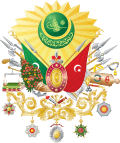Tapu (also Tabu) was a permanent lease of state-owned arable land to a peasant family in the Ottoman Empire. The term was also used to indicate the title...
2 KB (173 words) - 06:11, 26 April 2023
word "taboo" is derived Tapu (Ottoman law), a form of land tenure in the Ottoman Empire, subject to the tapu resmi tax Tapu (Bora Bora), a private island...
910 bytes (154 words) - 21:50, 18 August 2022
in society Tapu (Polynesian culture) (also spelled tabu), a Polynesian cultural concept from which the word taboo derives Tapu (Ottoman law) (also tabu)...
2 KB (271 words) - 10:55, 23 October 2023
Ottoman tapu system. To this day, the Land Registration Office is commonly known in Israel as the tabu, the Arabic pronunciation of the Turkish tapu....
57 KB (8,051 words) - 12:52, 19 September 2024
the Ottoman Empire covers the period 1299–1923. Trade, agriculture, transportation, and religion make up the Ottoman Empire's economy. The Ottomans saw...
53 KB (6,654 words) - 07:50, 1 November 2024
In the Ottoman Empire, a millet (Turkish: [millet]; Ottoman Turkish: ملت) was an independent court of law pertaining to "personal law" under which a confessional...
48 KB (5,793 words) - 22:32, 9 November 2024
The tapu resmi was a feudal land tax in the Ottoman Empire. A tapu was the equivalent of a title deed for farmland, in a feudal system where farmers were...
4 KB (517 words) - 12:30, 12 December 2023
Tanzimat (redirect from Ottoman Reform)
property law, law enforcement, and the military, to name a few. The end goal was to establish a powerful and centralized national government. Ottoman statesmen...
37 KB (4,195 words) - 04:26, 9 November 2024
successors had to pay a tapu tax (a sort of entry fine) to the landowner in order to get the land. Women played many roles in the Ottoman Empire, per their...
53 KB (7,004 words) - 21:03, 6 August 2024
judges who preside over matters in accordance with sharia Islamic law; under Ottoman rule, however, the kadi also became a crucial part of the imperial...
7 KB (850 words) - 21:38, 7 November 2024
Timar (redirect from Feudal system of the Ottoman Empire)
A timar was a land grant by the sultans of the Ottoman Empire between the fourteenth and sixteenth centuries, with an annual tax revenue of less than...
17 KB (2,237 words) - 22:13, 27 October 2024
Mülk (category Land management in the Ottoman Empire)
Mülk was a form of land holding in the Ottoman Empire. Mülk was similar to freehold land; owners could buy, sell, and mortgage freely. It was exempt from...
4 KB (465 words) - 07:55, 18 October 2024
Waqf (category Law of the Ottoman Empire)
Trust law Zakah Waqf of Ibshir Mustafa Pasha Complex AWQAF Africa Haryana Waqf Board (India) Ministry of Awqaf (Egypt) Ministry of Evkaf (Ottoman Empire)...
55 KB (6,358 words) - 02:49, 5 November 2024
the beginning of the 16th century the castle was maintained by the Ottomans. The Tapu Defter of 1519 records a cemaat of Christian müsellems in the castle...
3 KB (235 words) - 19:14, 10 November 2024
the Ottoman Empire changed drastically over time, and was a complex patchwork of different taxes, exemptions, and local customs. As the Ottoman Empire...
17 KB (2,278 words) - 20:00, 26 January 2024
Midhat Pasha (category Articles containing Ottoman Turkish (1500-1928)-language text)
known as nizam tapu. Sir Henry Dobbs recognised the three years of Midhat Pasha's governorship as the most stable and secure period of Ottoman rule in the...
27 KB (2,461 words) - 00:21, 8 November 2024
Bedouin (section Ottoman period)
Bedouin opted to register their lands with the Ottoman Tapu, due to lack of enforcement by the Ottomans, illiteracy, refusal to pay taxes and lack of relevance...
92 KB (9,668 words) - 22:41, 15 November 2024
original on 2015-09-21. "ΦΕΚ A 87/2010, Kallikratis reform law text" (in Greek). Government Gazette. Tapu Tahrir 1530, Muhabese-I vilaet-I Rum-ili Defteri (937/1530)...
23 KB (2,647 words) - 09:58, 23 October 2024
List of Turkish Germans (section Law)
who have arrived in Germany either from the Seljuk and Ottoman territories or from post-Ottoman modern nation-states (especially from the Republic of Turkey...
187 KB (14,907 words) - 15:14, 15 November 2024
Mawat land doctrine (category Land management in the Ottoman Empire)
been made productive could be retroactively registered in the so-called "tapu registers" for a registration fee, after which it automatically became something...
36 KB (4,091 words) - 22:24, 4 November 2024
wet rice cultivation where skill was paramount. The Ottoman agrarian system was based around the tapu, which involved a permanent lease of state-owned arable...
4 KB (482 words) - 08:36, 16 October 2022
An emin was an officer in the Ottoman empire; a "steward", the holder of an eminet, and often responsible for customs duties. Unlike a timar holder, an...
5 KB (545 words) - 12:32, 6 October 2022
the beginning of the 16th century the castle was maintained by the Ottomans. The Tapu Defter of 1519 records a cemaat of Christian müsellems in the castle...
101 KB (11,042 words) - 20:04, 6 November 2024
Negev Bedouin (section Ottoman Empire)
Bedouin opted to register their lands with the Ottoman Tapu, due to lack of enforcement by the Ottomans, illiteracy, refusal to pay taxes and lack of relevance...
110 KB (13,065 words) - 03:34, 20 November 2024
Jizya (category Taxation in the Ottoman Empire)
main sources of revenues collected by some Islamic polities, such as the Ottoman Empire and Indian Muslim Sultanates. Jizya rate was usually a fixed annual...
184 KB (23,394 words) - 06:54, 17 November 2024
Ispendje (category Taxation in the Ottoman Empire)
land tax levied on non-Muslims in the Ottoman Empire. İspençe was a land-tax on non-Muslims in parts of the Ottoman Empire; its counterpart, for Muslim...
4 KB (461 words) - 16:02, 22 September 2024
publish the first half of the Qur'an which is referred to as the Kuranu Tapu in the Māori language. Mr Monir spent a period of time in New Zealand and...
7 KB (700 words) - 07:33, 4 October 2024
Adet-i ağnam (category Taxation in the Ottoman Empire)
(literally meaning "sheep number") was an annual tax on sheep and goats in the Ottoman Empire. Initially, the tax was known as resm-i ağnam; the name changed...
7 KB (820 words) - 18:58, 10 April 2023
Confiscation of Armenian properties in Turkey (category Armenians from the Ottoman Empire)
The confiscation of Armenian properties by the Ottoman and Turkish governments involved seizure of the assets, properties and land of the country's Armenian...
85 KB (6,822 words) - 21:54, 21 November 2024
Müskirat resmi (category Taxation in the Ottoman Empire)
the Ottoman Empire. Strictly speaking, the Islamic law forbade alcohol, so there were no alcohol taxes in the early empire. However, the Ottoman Empire...
3 KB (404 words) - 22:33, 29 July 2023













